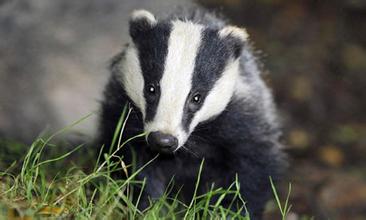(单词翻译:单击)
听力文本
This is Scientific American — 60-Second Science. I'm Jason Goldman.
Small carnivores—like foxes or raccoons or badgers—are themselves prey for larger predators—like wolves. So they spend time hiding instead of hunting. This influence that big predators have on their ecosystem is called a "landscape of fear." But humans are wiping out most of the world's big predators. Which you might assume is good news for the small ones.
But some researchers think that humans exert our own landscape of fear. Those foxes, raccoons and badgers just keep on hiding—only now, they're hiding from us. In reality, the situation may be far worse.
"Humans kill these smaller carnivores, so things like raccoons and foxes that we have here in North America, European badgers that they have in the U.K. and elsewhere in Europe, and we kill them at a rate that's four times greater than their conventional large carnivore predators..."
Liana Zanette of Western University in London, Ontario.
"Because our killing of these smaller carnivores is kind of off the scale, we're considered the superpredator."

To see how humans have altered the landscape of fear, Zanette and her team traveled to a small forest that's home to lots of European badgers near Oxford in the U.K. They used hidden speakers to broadcast the sounds of bears and wolves—two historic predators, both of which are no longer a threat. They also played the sounds of sheep, dogs and people. Hidden cameras recorded the badgers' willingness to look for food outside of their burrows as those sounds were played.
They discovered that the badgers have retained some of their fear of bear sounds, and know that dogs still pose a threat. But they've lost their fear of wolves.
"They treated the wolf calls just like the sheep calls."
Despite their fear of bears and dogs, the badgers still eventually went out to eat amid their sounds. But when they heard people "they would not emerge from their burrows at all until the human sounds were completely off. So they would cower in their burrows for the two hours that the sounds were on, waiting for those human sounds to go off."
In other words, they were leery of bears but were downright terrified of us. The findings are in the journal Behavioral Ecology.
"The badgers recognize who their enemies are...they have recognized humans as their principle threat."
Thanks for listening for Scientific American — 60-Second Science Science. I'm Jason Goldman.
参考译文
这里是科学美国人——60秒科学。我是杰森·古德曼。
狐狸、浣熊、獾等小型食肉动物是狼等较大食肉动物的猎物。所以它们大部分时间在躲藏而不是捕猎。这种大型捕食者对小型动物生态系统的影响被称为 “恐惧景观”。不过人类正在毁灭世界上大部分大型捕食动物。你可能会认为这对小型食肉动物来说是个好消息。
但是一些研究人员认为,人类正在施加我们自己的“恐惧景观”的作用。导致狐狸,浣熊和獾继续保持躲藏的状态,虽然现在它们只是躲着我们。但实际上,情况可能会更糟。
“人类猎杀这些小型食肉动物,所以像北美洲的浣熊和狐狸以及英国和欧洲其他地方的欧洲獾,人类对它们的猎杀率比它们传统意义上的天敌——大型食肉动物对它们的猎杀率要高4倍。”
利亚纳·詹尼特来自安大略省伦敦西大学。
“因为我们人类对这些小型动物的猎杀属于超标情况,所以人类应该被视为超级捕食者。”
为了查明人类是如何改变这种“恐惧景观”的,詹尼特和她的团队前往英国牛津郡附近的一个小森林,那里是大量欧洲獾的栖息地。他们使用隐藏的扬声器播放熊和狼的声音,这两种曾经的捕食者现在已经不再构成威胁了。他们还播放了绵羊、犬类和人类的声音。隐藏摄像机对獾在听到这些声音时是否愿意出洞觅食的情况进行了记录。
他们发现,獾对熊仍有一些恐惧,而且它们知道狗也对他们构成威胁。不过它们已经不再害怕狼。
“它们对狼叫的反应和听到羊叫差不多。”
虽然獾仍然害怕熊和狗,但是它们最后还是在这些动物的叫声中外出觅食。但是当它们听到人类的声音时,“直到人类的声音完全消失以后,它们才肯从洞里出来。所以在人类声音播放的两个小时里,它们可能会躲在洞里发抖,等待人类的声音消失。”
换言之,獾对熊保持警觉,但是对我们人类则是彻底的恐惧。这一研究结果发表在《行为生态学》期刊上。
“獾认出了谁是它们的敌人……它们把人类当作它们的主要威胁。”
谢谢大家收听科学美国人——60秒科学。我是杰森·古德曼。
译文为可可英语翻译,未经授权请勿转载!
重点讲解
重点讲解:
1. wipe out 摧毁;毁灭;使灭绝;
例句:Some animals have been wiped out through ignorance.
有些动物由于人们的无知而灭绝了。
2. in reality 事实上;实际上;
例句:The house looks very old, but in reality it's quite new.
这房子看起来很旧,实际上很新。
3. in other words 换言之;换句话说;也就是说;
例句:In other words, she must give up singing.
换言之,她必须放弃唱歌。
4. be leery of 猜疑的;警觉的;有戒心的;
例句:I tend to be a bit leery of cut-price bargains.
我对减价商品有点戒心。


